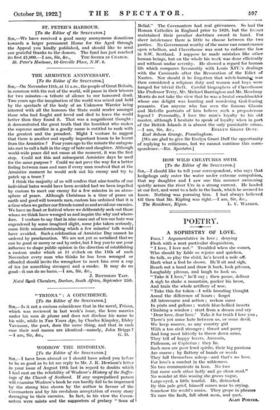WODROW THE HISTORIAN.
[To the Editor of the SPECTATOR.] SIR,-1 have been abroad or I should have asked you before to be so good as to let me reply to Mr. J. K. Hewison's letter in your issue of August 19th last in regard to doubts which I had cast on the reliability of Wodrow's History of the Suffer- ings of the Church of Scotland. If any unprejudiced person will examine Wodrow's book he can hardly fail to be impressed by the strong bias shown by the author in favour of the Covenanters and by his credulous acceptation of every story damaging to their enemies. In fact, in his view the Coven- anters were saints and the supporters of prelacy " Sons of Belial." The Covenanters had real grievances. So had the Roman Catholics in England prior to 1829, but the fo.-mer maintained their peculiar doctrines sword in hand. For sheer intolerance there is little to choose between the two parties. No Government worthy of the name can countenance open rebellion, and Claverhouse was sent to enforce the law in S.W. Scotland. I suppose he made mistakes like other human beings, but on the whole his wcsk was done efficiently and without undue severity. He showed a regard for human life which compares favourably with Louis XIV.'s dealings with the Camisards after the Revocation of the Edict of Nantes. Nor should it be forgotten that witch-burniw was then considered a religious duty and women and boys were hanged for trivial theft. Careful biographers of Claverhouse like Professor Terry, Mr. Michael Barrington and Mr. Mowbray Morris do not take the view that he was a brutal swashbuckler whose one delight was hunting and murdering God-fearing peasants. Can anyone who has seen the famous Glamis and Melville portraits of him believe such a preposterous legend ? Personally, I love the man's loyalty to his old master, although I hesitate to speak of loyalty when in part of the British Islands it is almost the only punishable crime.
—I am, Sir, &c., EVELYN GRANT DUFF. Earl Soham Grange, Framlingham.
[We are glad to give Sir Evelyn Grant Duff the opportunity of replying to criticisms, but we cannot continue this corre- spondenee.—ED. Spectator.]










































 Previous page
Previous page